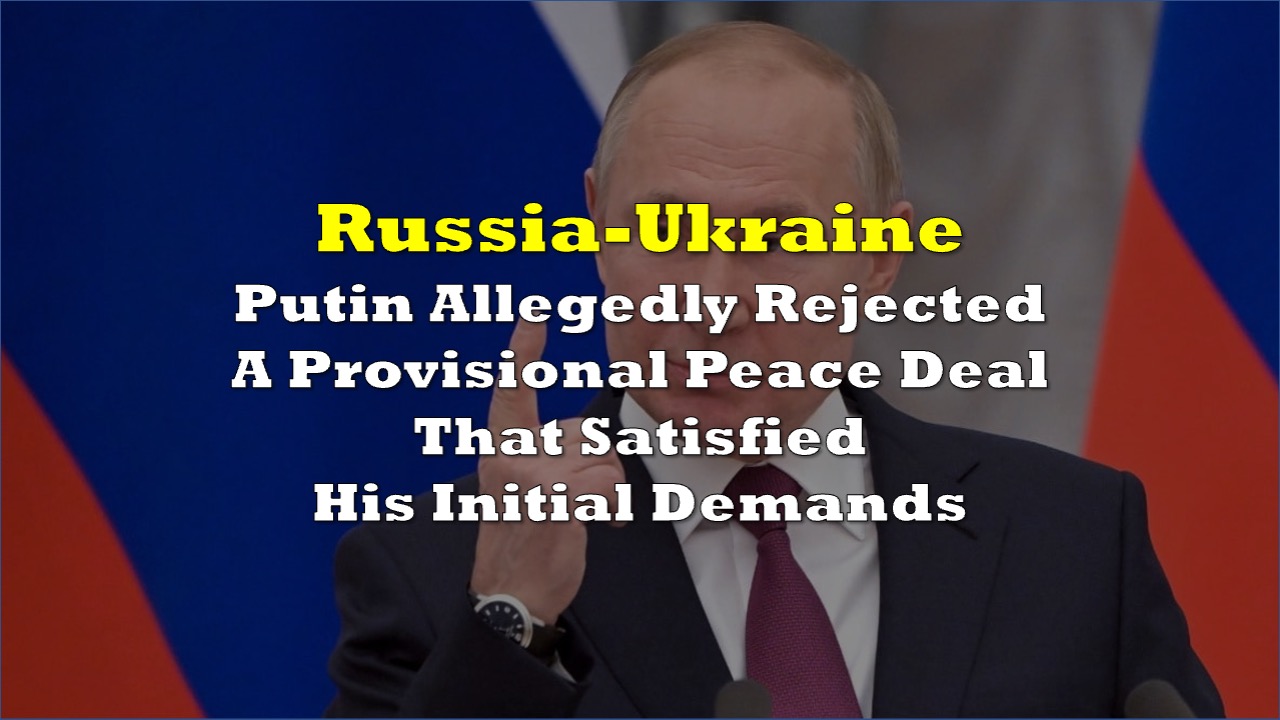Did Putin's Peace Talks Proposal Backfire? A Diplomatic Analysis

Table of Contents
The Initial Proposal: Context and Objectives
Putin's peace proposal emerged at a critical juncture in the conflict, following significant battlefield setbacks for Russian forces. The timing itself suggests a potential attempt to shift the narrative and consolidate Russia's position, rather than a genuine commitment to peace. From Russia's perspective, the stated objectives likely included: limiting further Western military aid to Ukraine, securing recognition of territorial gains, and ultimately, ending international sanctions.
- Key demands made by Russia in the peace proposal: These reportedly included the demilitarization of Ukraine, recognition of Crimea's annexation, and the acceptance of pro-Russian separatist territories in eastern Ukraine.
- International reaction to the initial proposal: The proposal was met with widespread skepticism and outright rejection from the West, with many viewing it as insincere and a tool for Russian propaganda. Some countries, however, expressed cautious optimism, highlighting the importance of any diplomatic efforts to end the conflict.
- Analysis of the proposal's plausibility: Given the ongoing hostilities and Russia's unwillingness to withdraw its forces, the proposal's plausibility appeared severely limited from the outset. The demands were deemed unacceptable by Ukraine and its allies, rendering the proposal a non-starter from the beginning.
Western Responses and Counter-Strategies
The response from key Western powers, including the US, EU, and UK, was swift and unified. The proposal was largely dismissed as a disingenuous tactic aimed at consolidating Russian gains and undermining Ukraine's sovereignty. Western counter-strategies focused on bolstering military aid to Ukraine, strengthening sanctions against Russia, and maintaining a united front against Russian aggression.
- Specific statements and actions taken by Western leaders: Statements from Western leaders strongly condemned the proposal, emphasizing the importance of Ukraine's territorial integrity and self-determination. Increased military aid and sanctions were announced.
- Analysis of the effectiveness of Western counter-strategies: The unified Western response effectively isolated Russia diplomatically and continued to provide Ukraine with the necessary resources to defend itself. This countered Russia's attempt to use the peace proposal to fracture Western unity.
- Discussion of the role of international organizations: The UN and other international organizations largely echoed the Western position, condemning Russia's aggression and supporting Ukraine's right to self-defense. This further marginalized Russia's peace proposal on the global stage.
Ukraine's Stance and the Impact on Negotiations
Ukraine's rejection of Putin's peace proposal was unequivocal. The Ukrainian government viewed the proposal as an attempt to legitimize Russia's illegal annexation of territories and its ongoing aggression. This firm stance, backed by significant international support, significantly undermined the viability of the Russian initiative.
- Key arguments presented by Ukrainian officials: Ukrainian officials argued that the proposal ignored Ukraine's sovereignty and territorial integrity, and demanded the complete withdrawal of Russian forces from Ukrainian territory as a precondition for any meaningful negotiations.
- Analysis of the domestic political implications within Ukraine: The rejection of the proposal solidified national unity within Ukraine, strengthening the resolve of the Ukrainian people and government to resist Russian aggression.
- Examination of the international support received by Ukraine: The international community overwhelmingly supported Ukraine's stance, further isolating Russia and demonstrating that its peace proposal lacked credibility on the global stage.
Assessing the Strategic Backfire: Long-Term Implications
Putin's peace talks proposal may be assessed as a strategic backfire for several reasons. It solidified Western unity against Russia, further isolated Russia diplomatically, and failed to achieve its primary goals. The proposal has likely strengthened, not weakened, the resolve of Ukraine and its allies.
- Impact on Russia's global image and diplomatic relations: Russia's global image has suffered further damage, exacerbating its already strained relationships with Western countries. The proposal reinforced the perception of Russia as an aggressor, undermining its international standing.
- Analysis of the effects on the ongoing conflict and its trajectory: The failure of the peace proposal likely prolonged the conflict, as it provided no viable pathway to a negotiated settlement acceptable to Ukraine. The conflict's trajectory continues to be shaped by military actions and Western support for Ukraine.
- Discussion of potential shifts in geopolitical alliances: The proposal has likely strengthened alliances between Ukraine and its Western supporters, while further isolating Russia on the global stage.
Conclusion
In conclusion, Putin's peace talks proposal appears to have backfired strategically. The initiative failed to achieve its intended objectives, solidified Western unity against Russia, and arguably strengthened Ukraine's resolve and international support. The proposal did little to advance a meaningful peace process, and instead contributed to prolonging the conflict. Understanding the intricacies of international diplomacy and the consequences of such proposals is crucial for comprehending the ongoing crisis. We urge readers to continue researching and engaging with this critical issue by exploring further resources on Putin's peace initiative, Russia's peace proposal, and analyses of Putin's peace plan to gain a more comprehensive understanding of this complex situation and its far-reaching consequences.

Featured Posts
-
 Death Penalty On The Table American Basketball Players Arrest In Indonesia For Drug Smuggling
May 18, 2025
Death Penalty On The Table American Basketball Players Arrest In Indonesia For Drug Smuggling
May 18, 2025 -
 Public Opinion In The Netherlands Against Eu Response To Trump Tariffs
May 18, 2025
Public Opinion In The Netherlands Against Eu Response To Trump Tariffs
May 18, 2025 -
 The Collapse Of Putins Peace Talks A Diplomatic Assessment
May 18, 2025
The Collapse Of Putins Peace Talks A Diplomatic Assessment
May 18, 2025 -
 Amsterdam Hotel Attack Police Investigation Following Knife Injuries
May 18, 2025
Amsterdam Hotel Attack Police Investigation Following Knife Injuries
May 18, 2025 -
 Netflix Documentary Details Phone Call That Led To Bin Ladens Death
May 18, 2025
Netflix Documentary Details Phone Call That Led To Bin Ladens Death
May 18, 2025
Latest Posts
-
 Kanye Wests Funeral Instructions Inspired By Pasha Technik
May 18, 2025
Kanye Wests Funeral Instructions Inspired By Pasha Technik
May 18, 2025 -
 Did They Split Kanye West And Bianca Censori Dine Together In Spain
May 18, 2025
Did They Split Kanye West And Bianca Censori Dine Together In Spain
May 18, 2025 -
 Pokhorony Po Uestovski Vdokhnovenie Ot Pashi Tekhnikom
May 18, 2025
Pokhorony Po Uestovski Vdokhnovenie Ot Pashi Tekhnikom
May 18, 2025 -
 Instruktsiya Kane Uesta K Sobstvennym Pokhoronam Vdokhnovenie Ot Pashi Tekhnikom
May 18, 2025
Instruktsiya Kane Uesta K Sobstvennym Pokhoronam Vdokhnovenie Ot Pashi Tekhnikom
May 18, 2025 -
 Kanye West Bianca Censori Enjoy Dinner Date In Spain Amidst Relationship Speculation
May 18, 2025
Kanye West Bianca Censori Enjoy Dinner Date In Spain Amidst Relationship Speculation
May 18, 2025
